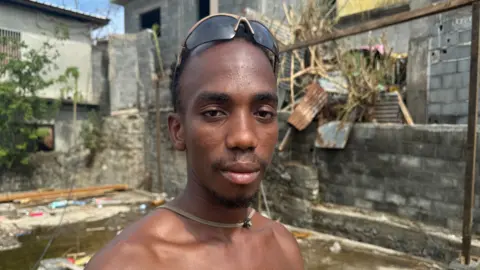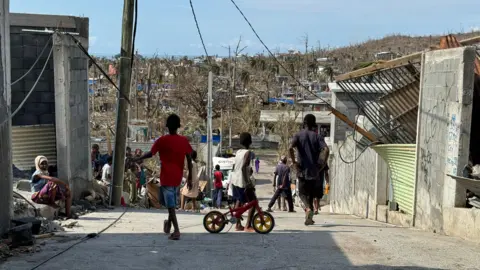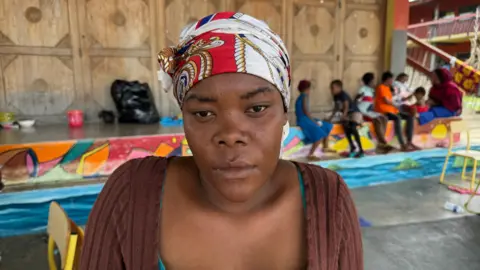‘I would rather die than leave my mother’: Survivors describe horror of Mayotte cyclone

 BBC/Ed Habershon
BBC/Ed HabershonThe night Cyclone Chido struck the French Indian Ocean territory of Mayotte, Zinedine was in his home, a small house made of corrugated iron and wood where he lives with eight of his relatives.
Zinedine had received warnings from the authorities about the cyclone, but he did not take it too seriously.
“I thought it was just like last years when they warned that a cyclone was coming but there would be little rain. So we stayed home.”
However this time the island was to be hit by strong winds of over 124 mph (200 km/h) – the most powerful cyclone to hit the island in almost a century.
According to French officials, 31 people have died so far and thousands are feared missing.
When another, more urgent cyclone warning came, Zinedine sprang into action.
“I told my mother that it had never happened before that he sent such a message, so I think it is serious this time.”
He suggested they go to their neighbors’ house, a brick-and-mortar house in a poor neighborhood high up in the hills of Petite Terre on Mayotte, the smaller of the two islands, not far from their home.
But his mother did not want to go, and felt he had to stay at home with his family. The 20-year-old tourism student is the eldest boy in his family and feels responsible for them.
When the storm began, she and her mother hid her younger siblings under a table. Then there was a loud sound.
“The iron roof of our house was blown off. We panicked and started looking for shelter. Iron sheets, wood and other large objects were flying everywhere.”
He took his siblings to the neighbour’s hut, when he looked back his mother had not come there.
“I decided to go back out to get my mother, even though the wind and everything was dangerous. I would rather die than leave my mother to die.”
His mother was standing in the middle of her damaged house, holding a one-year-old child in her arms. She was scared and was not letting the child go. Zinedine snatched it from his arms and ran to give it to the neighbors. Ultimately he had to take his mother out of the house.
“Luckily we are all safe but we lost everything. The only thing we were able to save were our papers and diplomas.”
 BBC/Ed Habershon
BBC/Ed HabershonNow he is trying to rebuild his family’s home. It is incredibly difficult to find new building materials in Mayotte at the moment due to high demand, and he could not afford a new roof for his house so he found some corrugated iron sheets blown away by the storm and planned to rebuild. Made. use them.
“I’m trying to do what I can. Even though I’m not a builder, I want to do it myself because I don’t know whether the authorities will help us or not.”
All across Mayotte, others like Zinedine are attempting to do the same, with hammers ringing late into the night.
But as resourceful as the people of Mayotte are, they are also angry at the lack of support they receive from the government.
During French President Emmanuel Macron’s visit to the islands on Thursday, He was scolded while trying to give a speechWhen he visited one hospital, frustrated staff complained of being overwhelmed.
Most of the people we spoke to in Mayotte had not received any government assistance even five days after the cyclone.
“We have only received food donations from volunteers, who have also given us clothes and water. The mayor’s office tried to help a little, but that’s all,” says Yasmin Moussa, an 18-year-old mother of three.
Immediately after receiving the storm warning on Friday afternoon, she took her three boys, the youngest of whom was just three months old, to the nearest shelter, a secondary school in the neighborhood of Laboratoire.
He said, “On the day of the cyclone, my children were crying because of the noise. When we looked outside we saw corrugated iron roofs flying everywhere. They kept asking me what was happening, why everything was falling apart.”
“I told them it was just wind and rain but the next day when they saw everything was destroyed. They couldn’t sleep that night.”
When she returned home she couldn’t recognize her neighbourhood.
 BBC/Ed Habershon
BBC/Ed Habershon“During the storm, mango trees had fallen and roads were being blocked. My neighbor had to tell me his house because I couldn’t even see him. There was water everywhere, the toilet was broken, my TV, everything was ruined. I tried to save what I could.
“I was in tears, I never thought this would happen.”
Now he has no place else to go. She says the conditions at the shelter are good but she needs a home to take her children. They now sleep on mattresses in a school classroom with a dozen other families.
“It’s not normal to sleep like this. The doors don’t lock and sometimes strangers come in. I worry about the safety of my children and that they will try to steal from us.”
The Red Cross told the BBC that at least 100,000 people were in shelters around Mayotte.
President Macron has promised compensation for the uninsured, who make up the majority of the population, but has not said how much they will receive.
The needs are great: almost all of the island has to be rebuilt. But some on the political right in France argue that spending too much money in Mayotte would only encourage more undocumented migrants to come to the French territory.
Back at La Vigie, Zinedine says he understands their objections but he disagrees.
“We’re human after all. And we need help.”






